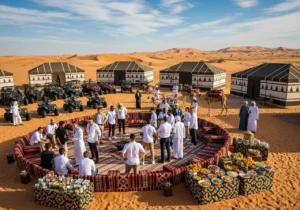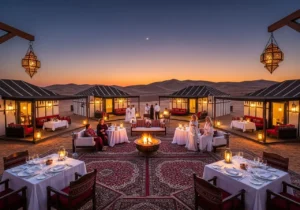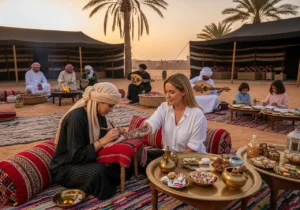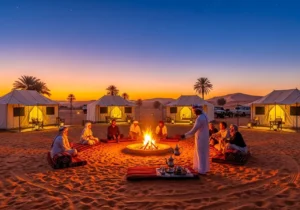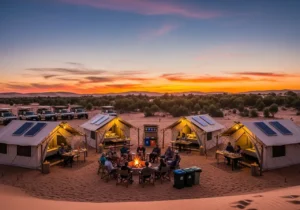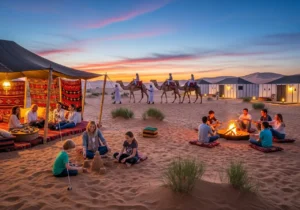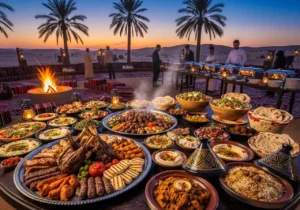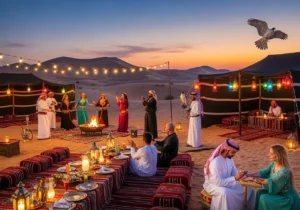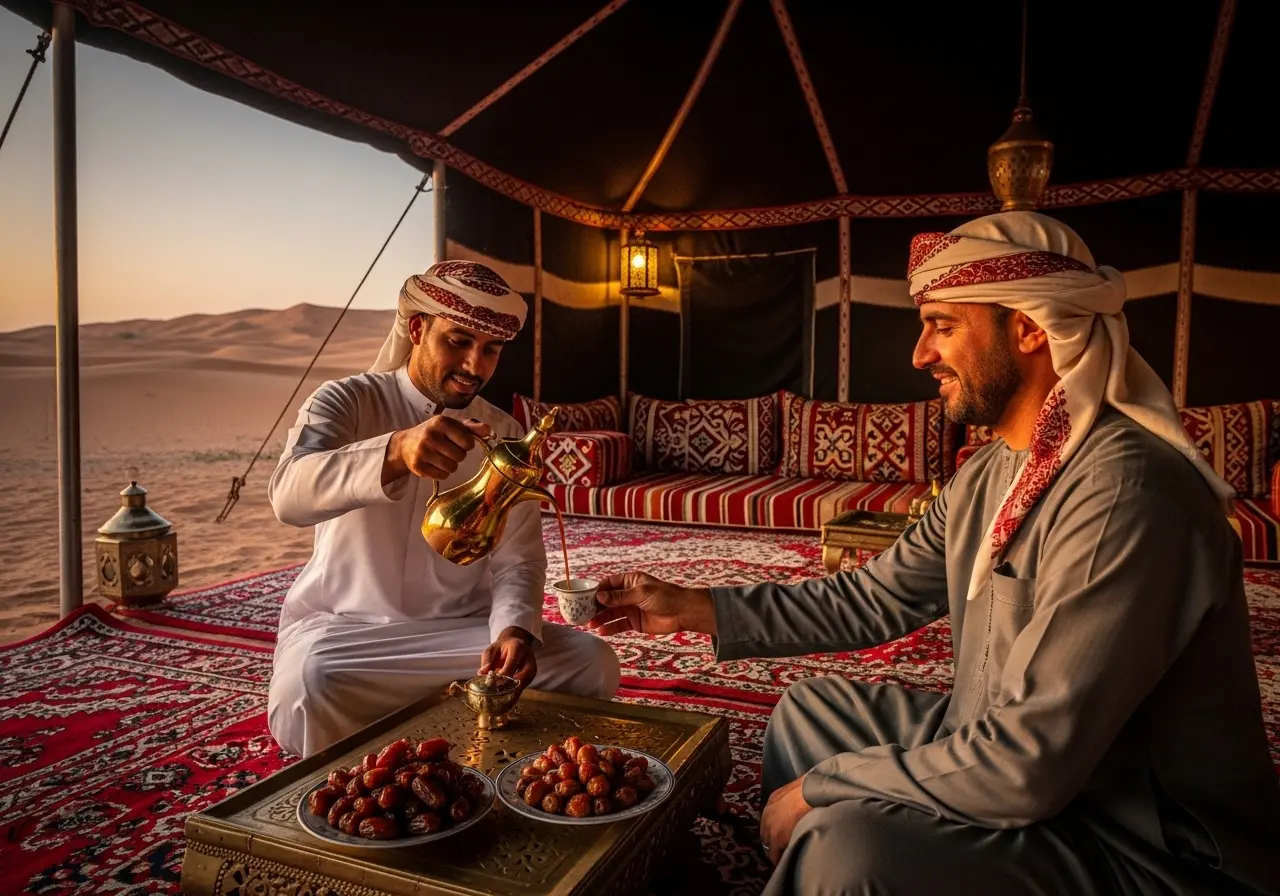The Soul of Welcome: A Guide to Arabic Coffee and Dates at a Desert Camp
The moment you step into a traditional Bedouin-style desert camp, before the thrill of the shows and the richness of the feast, you are greeted by a simple yet profoundly significant gesture. This is your ultimate guide to the tradition of Arabic Coffee and Dates, the beautiful and ancient welcome ritual that forms the true heart of a Dubai desert safari experience.
This in-depth exploration will take you on a journey into one of the most cherished pillars of Emirati culture. We will delve into the rich history and deep symbolism behind this seemingly simple offering. This is a comprehensive look at the Arabic Coffee and Dates ceremony, designed to help you fully appreciate the magic and meaning of this experience during your 2025 adventure.
We will uncover the secrets of “Gahwa,” from its unique, spice-infused flavor to the intricate etiquette that governs its serving. We will explore the revered status of the date palm, the “tree of life,” and understand why this perfect pairing is the ultimate expression of hospitality.
Prepare to be captivated by a tradition that is as warm and inviting as the desert landscape itself. This guide to Arabic Coffee and Dates will transform your first few moments at the camp from a simple greeting into a rich, unforgettable cultural immersion.
The Heart of Hospitality: Why This Ritual Matters
To fully appreciate the serving of Arabic Coffee and Dates, you must understand that in Emirati culture, this is not merely a beverage and a snack. It is a powerful and complex language of respect, generosity, and friendship.
A Legacy Forged in the Desert
The Bedouin, the nomadic people of the desert, lived in a harsh and unforgiving environment. Survival often depended on the kindness of strangers. Hospitality was not just a virtue; it was a cornerstone of their society and a vital part of their code of honor.
Offering a traveler a place by the fire, a sip of coffee, and the revitalizing energy of dates was a way of offering safety, respect, and a sense of community. This ancient tradition of welcoming any and all guests with open arms is a legacy that continues with pride in the modern UAE. The Arabic Coffee and Dates ceremony is the living embodiment of this legacy.
A UNESCO Intangible Cultural Heritage
The significance of this tradition is so profound that in 2015, “Gahwa,” or Arabic coffee, was inscribed on the UNESCO Representative List of the Intangible Cultural Heritage of Humanity. This recognition highlights its importance not just in the UAE, but across the Arab world as a ceremonial act of generosity.
This elevates the serving of Arabic Coffee and Dates from a simple custom to a globally recognized cultural treasure, and experiencing it firsthand is a true privilege.
Unveiling the “Gahwa”: A Deep Dive into Arabic Coffee
The first part of the welcome ritual is the Gahwa. The experience of tasting authentic Arabic Coffee and Dates is unforgettable. Forget the dark, strong espresso you may be used to; Arabic coffee is an entirely different and wonderfully aromatic beverage.
The Golden Beans: What Makes Arabic Coffee Different?
The unique character of Gahwa comes from its specific ingredients and preparation method.
- The Beans and the Roast: It is made from very lightly roasted green Arabica coffee beans. This light roast is what gives the coffee its distinctive golden, almost tea-like color and prevents it from being bitter.
- The Spice Infusion: The most important ingredient after the coffee is cardamom. The coffee is heavily infused with the warm, aromatic flavor of freshly ground cardamom.
- Other Spices: Depending on the family or regional tradition, other spices may be added, such as a few delicate threads of saffron (which enhances the golden color), a hint of cloves for warmth, or a touch of rosewater for a floral note.
The Art of the Brew: The Traditional Process
In a truly traditional setting, the preparation of the coffee is a ritual in itself.
- The Roasting: The green beans are roasted in a shallow pan (
mahmas) over an open fire until they reach the desired light color. - The Grinding: The roasted beans and cardamom are then ground into a coarse powder. Traditionally, this is done in a large, metal mortar and pestle called a
mihbaj. The rhythmic, clanging sound of themihbajwas a way of signaling to neighbors that coffee was being prepared and that they were welcome to join. - The Brewing in the Dallah: The ground coffee is then brewed in a beautiful, iconic, long-spouted coffee pot called a
dallah. The pot is placed on the embers of the fire and the coffee is brought to a boil and then left to steep, allowing the grounds to settle.
The Gahwa Ceremony: A Masterclass in Etiquette
The serving and receiving of the coffee is governed by a beautiful and intricate etiquette. Understanding this will deepen your appreciation of the Arabic Coffee and Dates experience.
The Role of the Host: The host, or in the case of a safari, the person serving the coffee (the muqahwi), will always pour the coffee for their guests. They will hold the dallah in their left hand and the stack of small, handleless cups (finjan) in their right.
Serving and Receiving:
- The server will pour a small amount of coffee—typically only a quarter of the cup full—and hand it to the guest of honor or the eldest person first.
- You must always accept the cup with your right hand. The left hand is traditionally considered unclean in many Muslim cultures.
- It is customary to sip the coffee, not to gulp it down.
The Signal for More (or No More): This is the most famous part of the etiquette.
- For a Refill: If you would like another cup, you simply hold out your
finjanto the server. - To Decline: If you have had enough, you politely signal this by gently shaking or tilting the empty cup from side to side a few times before handing it back to the server with your right hand.
This beautiful, non-verbal communication is a key part of the Arabic Coffee and Dates ceremony.
The Fruit of Life: The Revered Date Palm
The second, equally important part of the welcome ritual is the offering of dates. The pairing of Arabic Coffee and Dates is a perfect balance of flavors and a deep cultural symbol.
A Symbol of Life and Prosperity
The date palm is often referred to as the “tree of life” in the desert. For centuries, it has been a vital source of food, shelter, and materials for the people of the region.
- A Vital Food Source: In the harsh desert environment, the date provided a crucial source of nutrition, energy, and sweetness.
- A Symbol in Islam: The date palm is mentioned over 20 times in the Holy Quran, more than any other fruit tree, and it holds a special place in the Islamic faith. It is traditional for Muslims to break their fast with dates during the holy month of Ramadan.
- A Sign of Prosperity: A flourishing oasis of date palms was a sign of wealth and prosperity.
A World of Variety
There are hundreds of different varieties of dates grown in the region, each with its own unique size, color, texture, and flavor profile.
- Medjool: Large, soft, and with a rich, caramel-like taste.
- Khidri: A popular, versatile date with a chewy texture and a sweet, raisin-like flavor.
- Ajwa: A dark, soft, and fruity date that is grown in the holy city of Medina and holds a special religious significance.
- Sokari: Known as the “queen of dates,” these are very sweet and have a distinctive, cone shape.
The Perfect Pairing
The flavors of Arabic Coffee and Dates are a match made in heaven. The natural, intense sweetness of the date perfectly complements and balances the slightly bitter, aromatic, and spicy notes of the Gahwa. It is a combination that has been enjoyed and shared for centuries.
The Experience at the Desert Safari Camp
The Arabic Coffee and Dates tradition is the very first cultural encounter you will have upon arriving at your desert safari camp. It immediately sets a tone of warmth, welcome, and authenticity.
As you step out of your 4×4 after the thrilling dune bashing, you will be guided towards the entrance of the beautifully lit camp. Here, a welcoming host in traditional attire will be waiting for you with a steaming dallah of coffee and a platter of delicious dates.
This simple, powerful gesture is your official welcome into the world of Bedouin hospitality. It is a moment to pause, to catch your breath after the excitement of the dunes, and to begin your immersion in the serene and magical atmosphere of the desert camp. It is the perfect start to your evening of Henna Painting and Cultural Activities.
Integrating Your Cultural Welcome with a Full Adventure
The beautiful welcome ritual of Arabic Coffee and Dates is just the beginning of your incredible desert adventure. It is the gateway to a full evening of cultural discovery, thrilling entertainment, and delicious food.
To ensure you are booking a high-quality and authentic experience where these traditions are honored and explained with respect, it is wise to choose a reputable tour operator. For a truly premium adventure that focuses on delivering an exceptional and authentic cultural immersion from the moment you arrive, a company like https://royaldesertadventures.ae/ offers a range of top-tier safari packages.
When planning your complete Dubai vacation, it can be very helpful to work with experienced local tour companies. Reputable providers such as https://dubaidesertsafarie.com/ offer a comprehensive range of city tours and desert adventures to suit every traveler. For planning diverse excursions and activities across the UAE, https://hafiztourism.com/ is another excellent and trusted partner that can help you organize your perfect desert escape.
Frequently Asked Questions (FAQs)
- What is Arabic coffee, or “Gahwa,” and how is it different from other coffee? Gahwa is a traditional Arabic coffee that is very different from western-style coffee. It is made from very lightly roasted green Arabica beans, which gives it a golden, almost tea-like color. Its most distinctive characteristic is that it is heavily infused with spices, most notably ground cardamom, and sometimes saffron or cloves. It is served unfiltered, in a small cup, and is not bitter. This is a key part of the Arabic Coffee and Dates experience.
- Why is the coffee served in such a small cup? The coffee is served in a small, handleless cup called a
finjan. There are several reasons for this. Firstly, the coffee is meant to be sipped and savored, and the small cup encourages this. Secondly, it is a gesture of respect; by pouring only a small amount, the host is ensuring that the coffee served to their guest is always hot and fresh. It is also a practical consideration, as the host must hold a stack of these cups in one hand. - What is the correct etiquette for drinking Arabic coffee? The etiquette is an important part of the tradition. You should always accept the cup with your right hand. It is polite to drink at least one cup. To receive a refill, you simply hold your cup out to the server. To signal that you have had enough, you gently shake the cup from side to side two or three times before handing it back.
- Do I have to drink the coffee if I don’t like it? It is considered polite to accept at least the first cup as a gesture of accepting the host’s hospitality. However, the hosts at the safari camps are very understanding of different cultures and tastes. If you do not wish to have a refill, simply use the polite gesture of shaking the cup, and your host will understand completely.
- What are the most common types of dates served at the camp? The camps usually serve high-quality, semi-soft date varieties that are popular in the UAE, such as Khidri or Segai dates. These are delicious, sweet, and have a wonderful, chewy texture that pairs perfectly with the coffee.
- Is the Arabic coffee very strong in caffeine? Because it is made from lightly roasted beans and is brewed in a way that is more like an infusion, Arabic coffee is generally lower in caffeine than a strong, dark-roasted coffee like espresso. You can enjoy a few cups without worrying about feeling too jittery.
- What is the significance of the “dallah,” the coffee pot? The
dallahis the iconic, traditional coffee pot with a long, curved spout and a decorative lid. It is a powerful symbol of Arabian hospitality and is so important to the culture that it is even featured on the one-dirham coin of the UAE. This makes the Arabic Coffee and Dates ceremony even more significant. - Can I buy the coffee and dates I tried at the camp? Yes, many safari camps have a small souvenir stall where you can often purchase beautifully packaged sets of Arabic coffee, cardamom, and high-quality dates to take home with you as a delicious and authentic souvenir.
- Is this welcome ritual only for special occasions? No, the serving of Arabic Coffee and Dates is a part of everyday life in the UAE. It is a ritual that is performed when welcoming any guest into a home or an office, making it a very authentic and genuine glimpse into the local culture.
- What does the rhythmic grinding of the coffee beans signify? In traditional Bedouin culture, the coffee beans were ground in a metal mortar and pestle called a
mihbaj. The host would often grind the beans with a specific, rhythmic pattern. This sound would travel across the quiet desert, serving as an open invitation to any neighbors or nearby travelers that coffee was being prepared and that they were welcome to join. - Why is the right hand so important in the ceremony? In Islamic and many other traditional cultures, the right hand is considered to be the clean and polite hand, used for eating and for giving and receiving objects. The left hand is traditionally reserved for personal hygiene. Using your right hand to accept the coffee and dates is a simple but very important sign of respect.
- Are there any other welcome traditions I might see at the camp? In addition to the Arabic Coffee and Dates, you may also be welcomed with a spritz of rosewater on your hands, which is a refreshing and fragrant gesture. You will also notice the beautiful aroma of
bakhoor(incense) burning, which is another traditional way of welcoming guests into a space. - Is the coffee sweetened or served with milk? Traditional Arabic coffee is almost always served black and unsweetened. The sweetness is intended to come from the dates that you eat with it. It is not customary to add milk or sugar, although your hosts at a safari camp would likely accommodate a request for sugar if you made one.
- Where can I learn more about this tradition? The Sheikh Mohammed Centre for Cultural Understanding (SMCCU) in the Al Fahidi Historical Neighbourhood offers fantastic cultural meals and programs where you can learn about the Arabic Coffee and Dates ceremony and other Emirati traditions in great detail from a local host.
- What is the main takeaway I should have from this welcome ritual? The main takeaway is an appreciation for the profound importance of hospitality in Emirati culture. The tradition of serving Arabic Coffee and Dates is a beautiful, non-verbal language that communicates respect, generosity, and a warm welcome. It is a simple act that is filled with centuries of meaning and history.
The Enduring Taste of Welcome
The ritual of serving Arabic Coffee and Dates is the perfect, authentic introduction to your desert safari camp experience. It is a tradition that is steeped in history, rich in symbolism, and delivered with a genuine warmth that is the hallmark of Arabian hospitality.
It is a moment that invites you to slow down, to engage your senses, and to connect with the ancient traditions of the desert. This simple yet profound gesture sets the stage for an evening of cultural discovery, reminding you that in the heart of the desert, a warm welcome is the most precious treasure of all.


